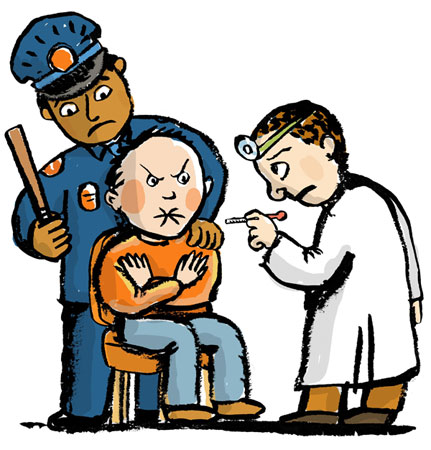Oddly, Judge Steeh does not characterize not purchasing insurance as "inaction," but rather as a delayed action. Which may or may not occur. But probably will. He supposes. Right? Bueller? Bueller?
Specifically:
The health care market is unlike other markets. No one can guarantee his or her health or ensure that he or she will never participate in the health care market. Indeed, the opposite is nearly always true. The question is how participants in the health care market pay for their expenses—through insurance, or an attempt to pay out of pocket with a backstop of uncompensated care funded by third parties.The Pacific Legal Foundation argues that this reasoning is flawed because "we are not active participants in the market for medical care until we seek medical attention."
This phenomenon of cost-shifting is what makes the health care market unique. Far from "inactivity," by choosing to forgo insurance plaintiffs are making an economic decision to try to pay for health care services later . . . .
Or, think about it like this: the fact that I will inevitably become hungry does not immediately make me a participant in the food market. After all, I have no idea what time I will want to eat, where I will eat, what I will want to eat, how much I want to spend on food, or any number of other decisions that affect the supply-demand mechanism inherent in the food market.
PLF also argues that the individual decision of whether to purchase insurance "is simply a decision against one possible way of financing health care, which one may or may not ever need."
Yes, that's right: it is entirely possible (and hopefully the case) that an individual who chooses not to purchase insurance will either not get sick, or will incur minor medical costs. Moreover, as PLF notes, "Congress could regulate" individuals who choose not to purchase insurance but attempt to shift their costs onto the public. This is a critical point because many people who do not have health insurance can afford it, but calculate that they can better spend their money elsewhere. And what right do we have to question such a decision?
Oh, of course, proponents of socialized medicine argue that we wind up paying for the health care of the uninsured anyway. This reveals its circular absurdity: they claim they want socialized medicine because they want everyone to receive medical care, but respond to criticism by alleging that it's better for society to provide everyone with insurance because the uninsured will receive medical care anyway. Pretty soon, they're going to need to make up their minds on this.
Regardless, the statists reason that engaging in an activity that may impose a future cost upon society (in this case, life) merits federal regulation. Doesn't this place us on a slippery slope? Since so many of our decisions can affect our health, providing us with medical care will give the government ample pretext to regulate . . . well, just about any decisions we make.
Let me count my medical sins for today: I started off with an inadequate breakfast; stressed out over a trial (that I eventually won); inundated my system with caffeine; ate a high-cholesterol steak salad for lunch; consumed more caffeine; and I've been typing this blog with my hot laptop resting on my legs (which probably isn't good for me). Oh yeah, and I'm skipping the gym for the second day in a row.
Those are my decisions, right? Well, using Judge Steeh's logic, perhaps my (and your) personal habits are quickly becoming society's business. If society pays for our health care, then society gets to regulate behaviors that affect our health.
I'm pretty sure this is not what the Founding Fathers had in mind.







Are you still obsessing over what the written Constitution means? Have you not learned to abstract from the words of that old rag the majestic principles that will arrive us at the golden shores of utopia? Let's stop bothering with those fusty old Founders. The tree of liberty must be refreshed from time to time with the cappuccino of loafers and miscreants.
ReplyDeleteRandy Barnett at Volokh pointed out a key passage from Steeh's ruling:
“The Court has never needed to address the activity/inactivity distinction advanced by plaintiffs because in every Commerce Clause case presented thus far, there has been some sort of activity. In this regard, the Health Care Reform Act arguably presents an issue of first impression.”
If the Court has never addressed this issue, and since the Constitution itself certainly does not go so far, then why in the world has Steeh failed to follow the Constitutional doctrine as it now exists, which would require him to hold that the individual mandate is not authorized by the Constitution? And liberals wonder why their judges get called "activists."